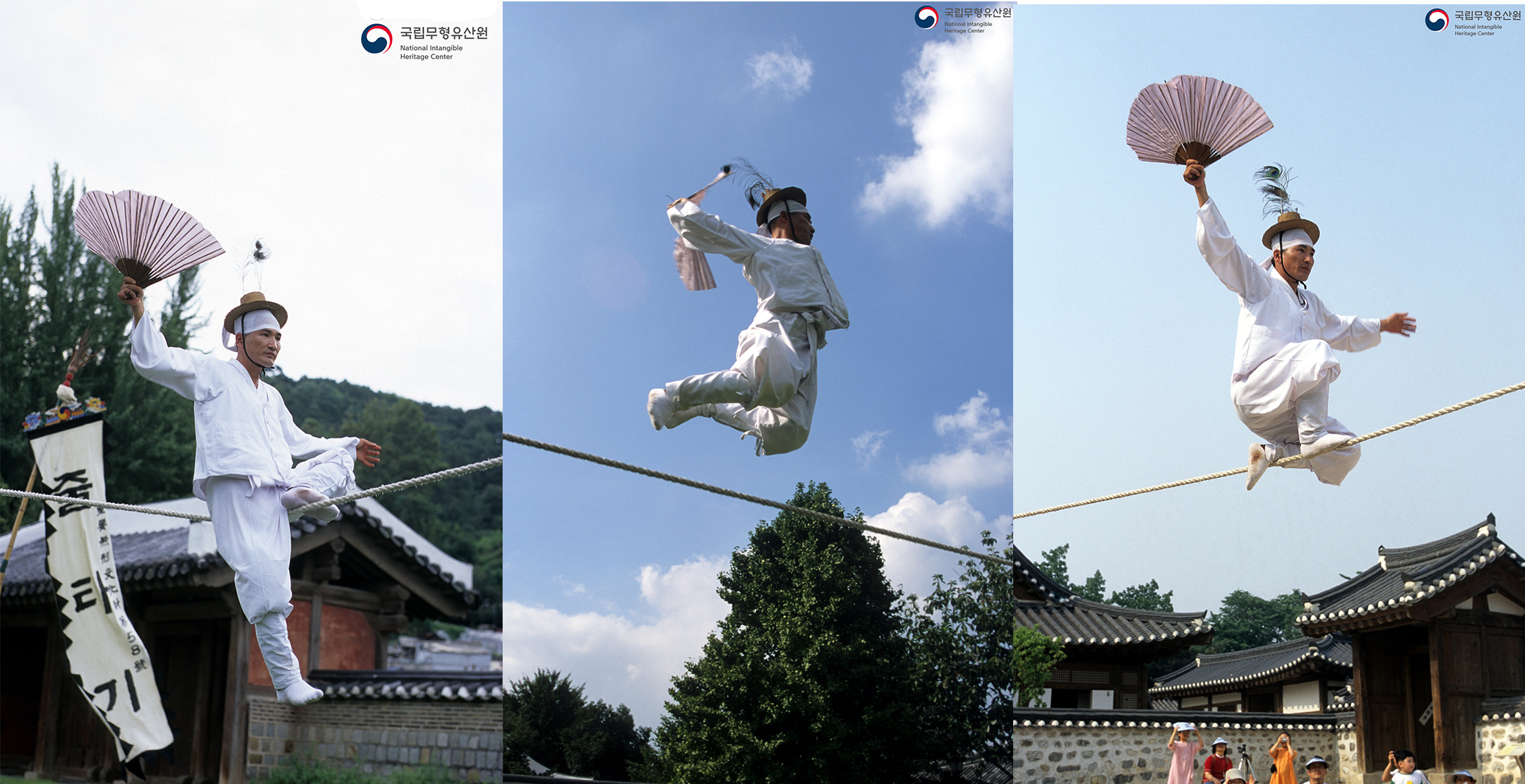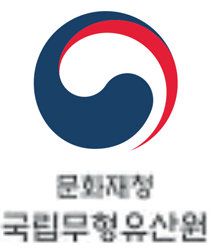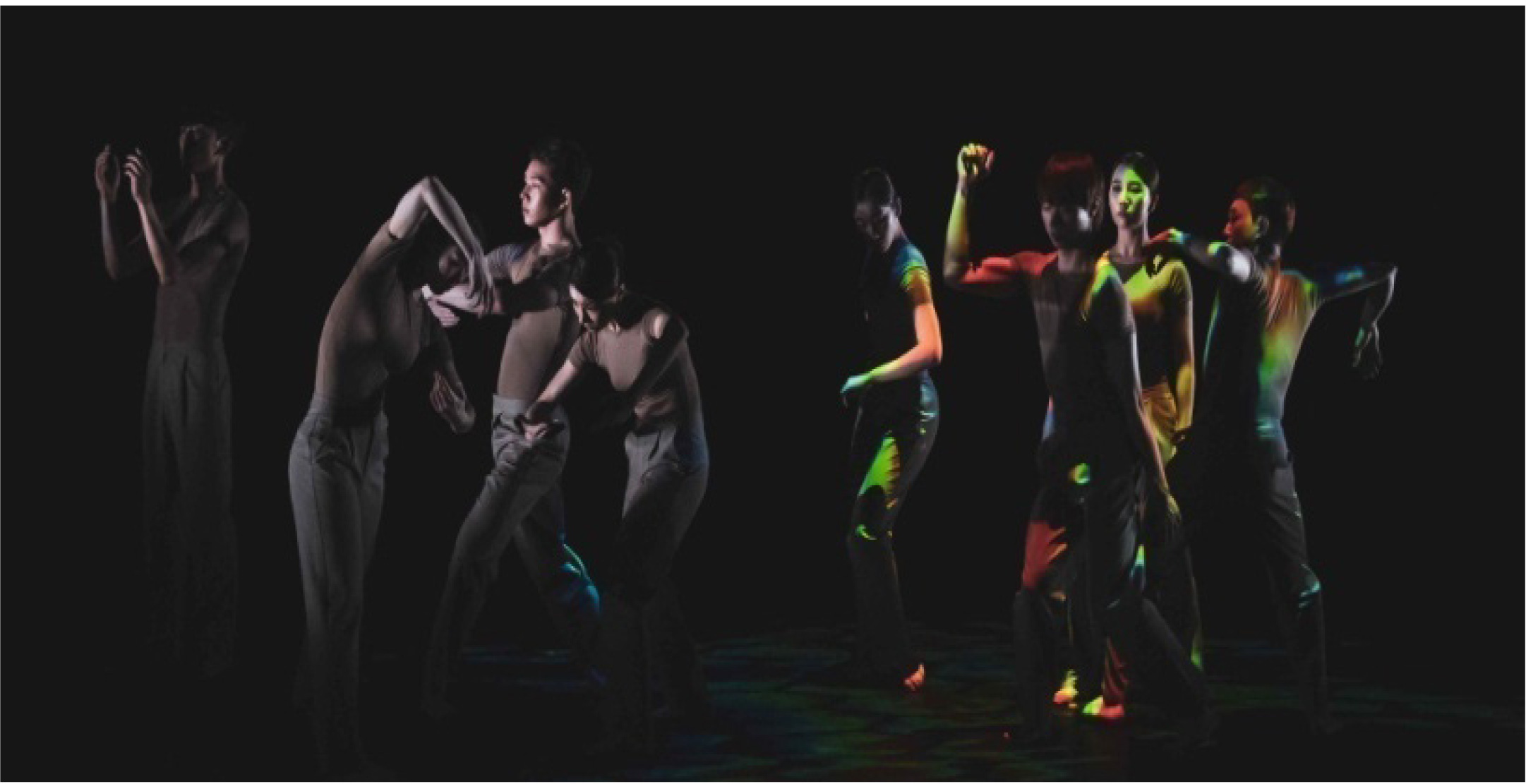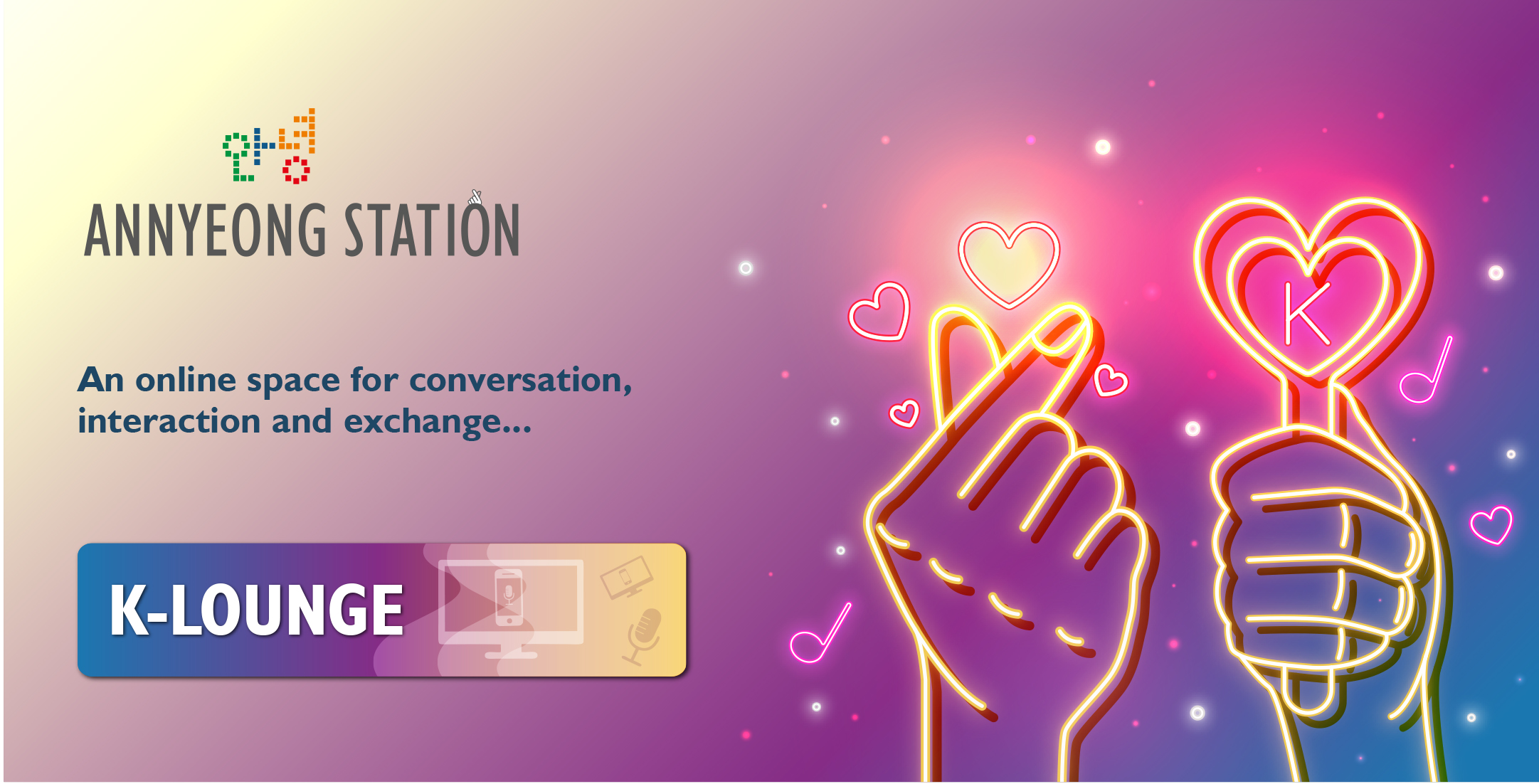
is presented in association with

The National Intangible Heritage Center,
Republic of Korea.
Cultural heritage can be tangible or intangible. Tangible cultural heritage refers to things that we can store or physically touch. Examples of tangible cultural heritage include traditional clothing, tools, buildings, artwork, monuments, and modes of transportation. Intangible cultural heritage refers to things that are not physical items but exist intellectually. Intangible cultural heritage includes oral traditions songs, rituals, values, superstitions and myths, beliefs, social practices and the knowledge and skills to produce traditional crafts. The Intangible Cultural Properties (무형문화재) are aspects of intangible culture that the government of South Korea has officially designated for preservation under the supervision of South Korea's Cultural Heritage Administration. Exceptional individuals are designated as the holders or invaluable repositories of these craft or performance traditions, and are referred to and supported as Living National Treasures.
The Cultural Heritage series aims to focus episodically on introducing and celebrating singular aspects of Korea's cultural traditions. In the fourth episode of this series, we focus on Jultagi or tightrope walking is a widespread form of entertainment that in most countries focuses purely on acrobatic skill.
Jultagi or tightrope walking is a widespread form of entertainment that in most countries focuses purely on acrobatic skill. The traditional Korean performing art of Jultagi is distinctive in that it is accompanied by music and witty dialogue between the tightrope walker and an earthbound clown. Jultagi is performed outside. The tightrope walker executes a variety of acrobatic feats on the rope, along with jokes, mimicry, songs and dance, while a clown engages the tightrope walker in joking banter while and a team of musicians play music to accompany the entertainment. The tightrope walker starts with simple feats, gradually moving to more difficult acrobatics, displaying some forty different rope techniques in a performance that can last several hours. Today, tightrope walking performers are frequently invited to local festivals that take place across Korea, particularly in spring and autumn. Currently, the training and preservation of traditional tightrope walking in Korea is centred on the Jultagi Safeguarding Association in Gyeonggi Province. There are two types of training programmes: apprenticeship education where masters educate practitioners and take on students, and public education, which include various initiatives such as school training, experience classes and summer camps.
The National Intangible Heritage Center's mission is to retrieve Korea's intangible cultural heritage from the past, to preserve it and to increase its value for future generations.
Set up in 2013, The National Intangible Heritage Center (NIHC) is located in Jeonju, a city known for its traditional music, architecture and cuisine. NIHC is the first complex administrative institution for safeguarding and transmission of Korean Intangible Cultural Heritage.
NIHC has various facilities such as permanent/special exhibition galleries, performance halls, archives, international conference rooms, learning spaces.
The primary roles of NIHC are safeguarding, transmitting, and fostering Korea's Intangible Cultural Heritage through research, archiving, exhibitions, performances, educational programs, support for the Masters of Intangible Cultural Heritage practices, and extension of the market for traditional crafts.
Tune in to https://www.youtube.com/user/InKoCentre on Thursday, 12 August 2021 at 6.00 p.m. IST.

is presented in association with

Korea National Contemporary Dance Company
is presented in association with

Attakkalari Centre of Movement Arts
A discussion with practitioners and industry experts curated by Attakkalari Centre of Movement Arts.
Shin Changho is known for his evocative productions that are full of powerful energy and his experimental work that oscillates between the present and the future. In Man-Made, for which he collaborated with the National Dance Company of Korea in 2018, he experimented with combining technology and dance using Virtual Reality. He later staged the work IT dealing with the theme of AI for the 40th Seoul Dance Festival. His new work Beyond Black is the result of his continued exploration of technology and the future.
In 1999 when he was a student at the School of Dance of Korea National University of Arts, Shin was selected as a member of the Transitions Dance Company of the Trinity Laban Conservatoire of Music and Dance in UK. He was one of the founding members of the LDP Dance Company (founded in 2001) and served as the representative of LDP for 6 years from 2009. He also worked as a regular member of the Dance Company Theater St. Gallen in Switzerland from 2005 to 2006.
Shin, who has extensive experience of working for national and international dance troupes, has made a splendid contribution with his works invited for presentation in several countries abroad. His signature works No Comment and Platform were invited to Austria and included within the repertoires of The Ballet Company of TLT Innsbruck. This was the first instance that works by a Korean choreographer were included in a European professional ballet company as fixed repertoires. From 2012 to 2017, he was also invited as a guest choreographer for this dance company.
His major choreographic works include No Comment, Parallel Life, Long Slow Distance, It's My Life, Platform, Eye-to-Eye Contact, Not only has he been actively engaged in choreographic activities, but Shin has served as a Professor of the Department of Dance Performance, School of Dance at Korea National University of Arts since 2013, to nurture new dancers with support and advice in the education field.
SLITSCOPE's work ranges from a discussion about virtual and the real as well as to a contemplation of the relationship between Artificial Intelligence (AI) and humans. The SLITSCOPE team developed Madi, a dancing AI, with the ability to choreograph for Beyond Black.
This AI developed by SLITSCOPE has no knowledge of the principles of dance or of movement or nuances of emotion. It only observes continuous movements to produce similar outcomes based on accumulated data. Audiences are invited to see the 'phenomena lacking meaning' that this virtual artist presents. Recently, SLITSCOPE's research case was chosen for the support project by the Korea Foundation for the Advancement of Science and Creativity and was introduced at the exhibition titled (dis) Appearition (7 February - 1 March, 2020, Post Territory Ujeongguk). Through Beyond Black, SLITSCOPE questions if the audience can discover the soul of AI while watching the performance.
Credits:
Production Distribution: Korea National Contemporary Dance Company
Year of Production: 2020
Choreography: Shin Changho
Film Director: Kang Seungpyo
Creative Advisor: Lee Yongwoo
Lighting Design: Kong Younwha
Stage Design: Lee Taeyang
Media Art: Kim Jaemin
Music: Jang Jiho
Costume Design: Choi Insook
AI Development: SLITSCOPE (Kim Jaemin, Kim Keunhyoung)
Dancers: Kim Yeona, Kim Junki, Park Jihee, Jang Solyn, Choi Yewon, Choi Jeonghong, Han Daegyo, Ham Heewon, Jung Dayeon (Madi’s voice)
Pictures Inc.: Haemil Pictures Inc.
Established in 2010, the Korea National Contemporary Dance Company (KNCDC) is Korea's only national contemporary dance company. Through dance created in collaboration with artists with exceptional creative capacities, KNCDC aspires to create Korean contemporary dance which tells stories of history, society and daily lives of contemporaneity that can be appreciated across regions and by all generations.
As an organization that specializes in the creation of new productions, KNCDC seeks to realise diverse contemporary values in dance performances. KNCDC commissions productions by inviting choreographers with authentic artistic directions and by selecting the most suitable dancers for each project. Furthermore, by protecting the rights of the artists, KNCDC enables artists to freely express individuality within the dance company’s stable system.
KNCDC continues to work to provide the best environment for dance where the artists and audience can grow together. And as a platform where artists and audiences meet, the company hopes to form a healthy ecosystem where diverse values can coexist. KNCDC plans to enrich the lives of citizens through their experiences with dance at close proximity, in their day-to-day life.
Attakkalari Centre for Movement Arts, Bengaluru, is India’s premier contemporary dance organization working in the realm of education, training, research, choreography, productions, performances, festivals, and stage technologies. Invested in inclusive and ecologically conscious dance practices, holistic education, collaborations, and transdisciplinary exchanges, Attakkalari has developed strategic partnerships with educational institutions, arts organizations as well as entities working for social justice in India and internationally. This apart, Attakkalari produces the Attakkalari India Biennale – South Asia’s biggest festival on contemporary arts whose next edition is programmed for 2021-22. Transmedia Technologies is the tech production vertical for Attakkalari – this is the only instance for an Indian cultural organization to have its own tech division that provides production support to the organization’s consolidated initiatives.
Beyond Black premieres at www.inkocentre.org/Virtual_Connect_Cultural_Collaborations.html on Friday, 20 August 2021 at 6.00 p.m. IST. The Talking Dance: On Screen discussion follows soon after the screening.
The film can be viewed until 26 August 2021.

Moderator: Puja Talwar
Puja Talwar is the Executive Editor, Lifestyle and Entertainment, Good Times with over 25 years' experience in Broadcast Journalism. Puja is a Content Creator, Show Host, Moderator and a published Writer. She host the popular series 'Candid Conversations With Puja Talwar' on You Tube, and a podcast titled ‘Entertainment Unlimited on Spotify. She lives for coffee, travel and K dramas!
Our guests include:
Nikita Engheepi is a lawyer and one of the founders of Pink Box Events, India's first Event Company to organise exclusive K-pop Concerts. The first K-pop concert in India organised independently took place in 2015. Pink Box has over the years, partnered with the Korean Cultural Centre India, the Embassy of the Republic of Korea, and with KOTRA (Korea Trade-Investment Promotion Agency) for various concerts across India. Pink Box events has also collaborated with State Governments of Nagaland, Sikkim, Mizoram, and Meghalaya. As one of the first promoters of K-pop in India, Pink Box has organised 24 K-pop Concerts/events spread across 13 cities/states in India, has worked with 8 K-pop groups/artist and has been associated with SNS events with 6 K-pop groups/artists. The biggest K-pop concert in India to date is with K-pop group, M.O.N.T at the Hornbill International Music Festival in Dimapur, Nagaland. It drew in a crowd of approximately 13000 people. Pink Box has also worked with DSP Media Idols, Kard and they are by far the most successful idols to have performed in India.
Riddhi Chakraborty is the Assistant Editor and Video Producer at Rolling Stone India. She has been writing about music for ten years and K-pop for five years and is the only Indian journalist to have interviewed over 40 Korean artists. She has led on-ground and remote photoshoots and projects in Korea and India and is the first producer in India to create exclusive video content with South Korean artists. Her goal is to promote Indo-Korean cultural exchange and help fans connect with their favourite artists.
Monica Yadav is Senior Entertainment Journalist, Bollywood Hungama, who has vast experience in writing about the K-pop phenomenon with interviews with Korean artists as well creation of well-researched video content, backed by photoshoots in Korea and India.
Tune in for a lively conversation at www.inkocentre.org/Virtual_Connect_Infotainment.html on Friday, 27 August 2021 at 6.00 p.m. IST.